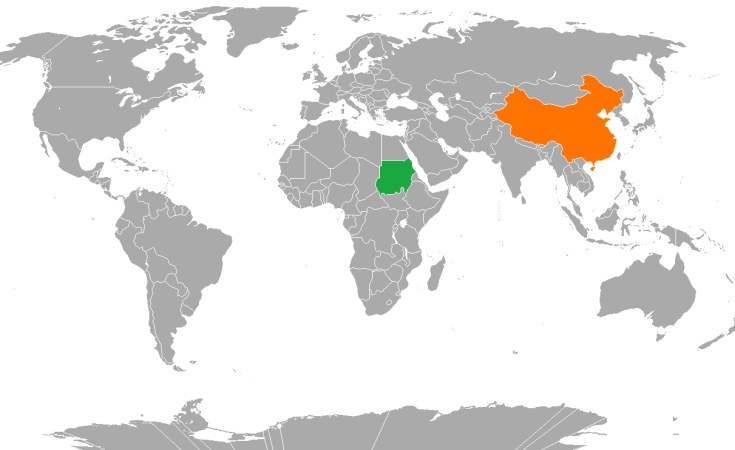Cairo — China has been a major investment partner in Sudan's energy, agriculture and transport sectors in recent years, pumping nearly $6 billion in investments into the country since 2005.
Its interests in Sudan date back to 1959, but China began to flourish on a broader level after the U.S. placed the country under economic sanctions in 1998. And now, as nations work to extend a shaky cease-fire between rival forces, China is looking to maintain a neutral stance and advance its own interests as well.
China played a key role in developing Sudan's oil fields before the country split into north and south in 2010, investing close to $3 billion, according to some sources. Chinese workers built much of the project's infrastructure before it was handed over to the newly independent South Sudan. A pipeline to transport the oil continues to flow through the north of Sudan, where it is ultimately shipped from Port Sudan.
In 1959, Khartoum became one of the first Arab states to recognize the People's Republic of China. Medical aid and construction projects like the People's Hall in Khartoum were signature pieces of early cooperation between both countries.
And Beijing's interests with Sudan flourished during the years that former leader Omar al-Bashir ruled the country, Washington-based Middle East analyst Theodore Karasik told VOA.
"China's interest in Sudan has been long and significant in terms of previous energy and other contracts, especially in mining and agriculture," Karasik said. "Beijing was also close to the Bashir regime, which had contracts with China's defense producers. Many of these interests also seem to overlap with Iran's interest in Sudan's Military Industrial Company."
China "has taken a neutral stance in the current conflict in Sudan," Karasik said, noting that China "invests very heavily in infrastructure," such as "building a national rail system for some east African states." He also pointed out that China is "involved in peacekeeping in some regional states" and "has plans for logistic operations out of Port Sudan in a post-war Sudan."
Relations between China and Russia are also problematic in Sudan, where both countries appear to have differing interests and strategies. "The real question," said Karasik, "is how Russia will interact with China in Sudan because in different parts of the continent they behave differently, or sometimes in tandem, in terms of their approach to extraction economics."
"Sudan in China's larger regional strategy is part of a maritime arena that becomes critical in global shipping," he added. "It is not a coincidence that improving healthy Saudi-Chinese ties are occurring at the same time that Sudan is going through its catharsis. It's clear that China uses different partners for Sudan's business."
Egyptian political sociologist Said Sadek told VOA that China's interests in Sudan are related to its regional geography and the growing strategic importance of the Red Sea basin to world trade.
"The other motivation of course is [China's Belt and Road Initiative], because they wanted to be in the Red Sea and their only foreign base abroad is in Djibouti and this is part of their expansion in Africa, including Egypt, Sudan, Ethiopia, Eritrea ... as they see that the Red Sea is going to be a very important place for strategic assets, [such as] oil, gas, and tourism," Sadek said.
"The Saudis are currently building their $1 trillion NEOM project [planned smart city in Tabuk Province in northwestern Saudi Arabia] on the opposite side of the Red Sea," Sadek added, "with islands that are going to be like Las Vegas or Monte Carlo," so "China wants a strong presence in the area."
Sadek said that "most of Africa's 54 countries are poor and China is very active in providing economic aid. ... [China] enters with soft loans and it builds infrastructure, because most African countries lack infrastructure ... and [Beijing doesn't] ask questions about human rights and democratization like the U.S. does."
Paul Sullivan, Middle East analyst at the Atlantic Council, told VOA that China has focused its strategy on several areas in its efforts to cultivate stronger ties with Sudan.
"Sudan is a big part of China's overall strategy in the region to bring east and North Africa more on its side," he said. "It has a lot to do with business, investments, infrastructure and even education, including teaching Mandarin to Sudanese. Sudan is a significant player in the Nile Basin but is weak and uncertain now, but has great potential with the right leadership. Instability and uncertainty open Sudan up to exploitation by other countries, terrorists, and organized crime."
China is "interested in gold deposits in Sudan," Sullivan said, adding, "like Russia, China is also interested in ports in Sudan." He noted that a "pipeline system from South Sudan via Uganda to the Kenyan coast will likely get more interest after [the current conflict subsides]."
U.S. and Chinese interests in Sudan and the region are at odds, Sullivan said, because the U.S. does not want a Chinese or Russian military or other port in Sudan, given "the sensitive strategic locations" of Port Sudan. Sullivan also underscored that China is trying "to block the U.S. more and more."


